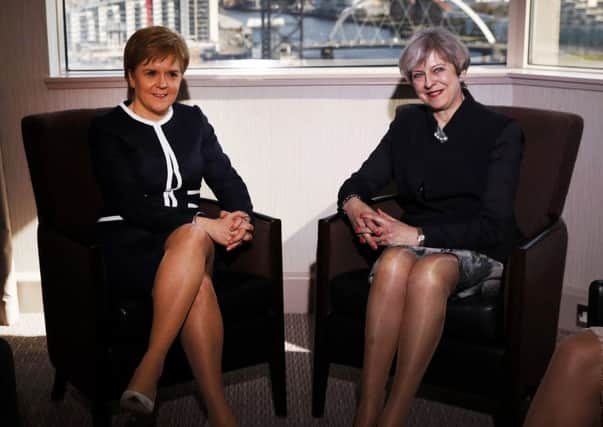May and Sturgeon still polls apart on Scottish independence vote issue


The two political leaders held talks yesterday over the timetable for Britain’s divorce from the European Union as Ms Sturgeon continued to push for another vote for Scotland to leave the UK between autumn 2018 and spring 2019 – a timescale Mrs May is set to reject.
Advertisement
Hide AdAdvertisement
Hide AdThe Prime Minister has maintained that a referendum during that period would be “unfair” to voters because they would not have all the necessary information to make a fully informed choice.
Following the meeting in Glasgow yesterday afternoon, Ms Sturgeon insisted the Prime Minister had been clear the terms of the UK’s departure from the EU and the details of a new free trade deal would be known within two years.
Advertisement
Hide AdAdvertisement
Hide Ad“I think it makes it very difficult for the Prime Minister to maintain a rational opposition to a referendum in the timescale I have set out,” Ms Sturgeon said.
“I think she has got a perfectly rational opposition to a referendum now, which is why I am not proposing it. But I think based on the discussion today I would struggle to see what her rational opposition to it would be in the timescale we have been talking about.”
The meeting came just a day before the Scottish Parliament is expected to pass a vote in favour of seeking another independence referendum, and on the eve of the day on which Mrs May is due to trigger Article 50.
Ms Sturgeon described the talks as “cordial” and “business-like”, although she said Mrs May had made no offer on powers to be devolved to Scotland as part of the Brexit process.
Advertisement
Hide AdAdvertisement
Hide AdAsked about what would happen if her call for another referendum was formally rejected, Ms Sturgeon said: “I will set that out in due course. I actually have views in my mind around that.
“If their position remains as it is right now, I will set out to Parliament what I think the next steps should be.”
Ahead of the meeting, Mrs May told reporters her position would not change on Ms Sturgeon’s call for a referendum by spring 2019.
She would not be drawn on whether a vote could take place further into the future, restating her view that “now is not the time” for another ballot.
Advertisement
Hide AdAdvertisement
Hide AdThe Prime Minister also vowed to build a “more united nation” as Britain leaves the EU.
Mrs May added: “Now is the time when we should be pulling together, not hanging apart. Pulling together to make sure we get the best possible deal for the whole of the UK.
“Also I think it would be unfair on the people of Scotland to ask them to make a significant decision until all the facts were known, at a point where nobody knows what the situation is going to be.”
Last night on the BBC’s Question Time programme from Birmingham, Nick Clegg, the Sheffield Hallam MP, said this was the time that “reality bites”, adding: “Let’s not delude ourselves.
“You can’t leave the club without paying the bills.”
Advertisement
Hide AdAdvertisement
Hide AdBut David Davis, the Brexit Secretary and Haltemprice and Howden MP, said: “How many of the economic forecasts about Brexit have come true? None!”
He claimed there was a lot of misplaced pessimism on Brexit and said: “There will be a deal.”
On immigration, Mr Davis sought to reassure EU citizens working in the UK, in the NHS for example, saying that giving them guarantees would be the “top priority during negotiations”.
Read more...